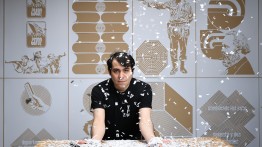Hamlet Lavastida, "The Other Memory of Cuban Revolutionary Culture"
Saturday, March 26, 2022, 12 - 1:30pm

Photo by Peter Rosemann, 2021.
Hamlet Lavastida gives a free, online lecture as part of the Spring 2022 Intra-Disciplinary Seminar series. Lavastida's work is about historical memory and the efforts of the Cuban political power structures to impose official narratives of the revolution that are rife with structured absences. He employs a range of aesthetic strategies to explore how Cuban intellectuals have confronted the state and how the state has treated its intellectuals. In his talk, he will focus on the intersection of historical memory, graphic design, conceptualism, and activism to reveal the inner workings of cultural policies implemented by socialist administrations. Those policies have engendered opposition from artists and intellectuals to this day.
Hamlet Lavastida (b. 1983, Cuba) explores the relationship of language and ideology in his art practice. A graduate of Havana’s University of the Arts and Tania Bruguera’s Taller de Conducta, he has exhibited in Spain, Poland, Germany and the United States. His artworks focus on Cuban revolutionary history, but his research is informed by his comparative analyses that extend to the study of political discourses of postwar Eastern Europe. He investigates cultural politics as expressed through design, the architecture of public space, and historiography. His interdisciplinary practice encompasses video, collage, performance, public interventions and installation. His critical vision of his country’s history and current affairs is perceived by Cuban authorities to be a threat to national security. Lavastida was arrested in June, 2021, upon return to Cuba after a year in Berlin at an artist’s residency. He spent three months detained in Villa Marista, headquarters of Cuban state security, before being deported to Europe by the Cuban government. He currently resides in Berlin.
The IDS public lecture series is part of the Robert Lehman Visiting Artist Program at The Cooper Union. We are grateful for major funding from the Robert Lehman Foundation. The IDS public lecture series is also made possible by generous support from the Open Society Foundations.




